|
|
|
Sort Order |
|
|
|
Items / Page
|
|
|
|
|
|
|
| Srl | Item |
| 1 |
ID:
192514
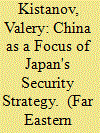

|
|
|
|
|
| Summary/Abstract |
This paper deals with Japan's current security policy toward China. Both countries have now become major trade and economic partners, but at the same time, their political ties have deteriorated significantly. Over the past decade, the degree of conflict in Japanese-Chinese relations has increased dramatically, despite consistent efforts by Tokyo and Beijing to improve bilateral ties through political and diplomatic measures. Japan is increasingly concerned about China's offensive naval activities in the East and South China Seas, which Tokyo regards as an area of vital interest. The most acute points of confrontation today are the situations around the Senkaku Islands and Taiwan, which could escalate into armed clashes. With the adoption of Tokyo's new National Security Strategy in December 2022, China has in effect been elevated to the main military threat to Japan. Under this strategy, Tokyo has embarked on a course of strengthening its military capabilities, paying particular attention to their offensive component. Moreover, in preparation for responding to the "Chinese threat," Japan is taking measures to qualitatively and quantitatively strengthen military cooperation with the US under a security treaty. The military alliance with the US will remain the cornerstone of Japan's security for the foreseeable future, including with the aim of deterring an increasingly powerful China.
|
|
|
|
|
|
|
|
|
|
|
|
|
|
|
|
| 2 |
ID:
175941
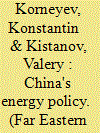

|
|
|
|
|
| Summary/Abstract |
The principles of shaping and implementing China's energy policy have undergone significant changes since the early 2000s, due to China's increasing geopolitical role in the world and its becoming the largest importer of primary energy resources, crude oil and natural gas. The adaptation of Japan's experience has played a significant role in this process - the stages of development that Japan's energy policy had previously undergone are undoubtedly repeated now in China. The similarity of the economies, their export-oriented nature, and the lack of their own fossil fuels have manifested themselves. The analysis and assessment of the peculiarities of China's energy policy development, complemented by Japanese experience, will make it possible to explore the topic of this article more fully, without focusing solely on domesticl Chinese problems.
|
|
|
|
|
|
|
|
|
|
|
|
|
|
|
|
| 3 |
ID:
136745
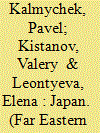

|
|
|
|
|
| Summary/Abstract |
The victory of the liberal democracy party (LDP) and the Komeito Party in the December 2012 elections to Japan’s lower house of parliament (house of representatives) helped stabilize that country’s domestic political solution.
|
|
|
|
|
|
|
|
|
|
|
|
|
|
|
|
| 4 |
ID:
166016
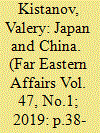

|
|
|
|
|
| Summary/Abstract |
Territorial conflict and divergent perceptions of the history of bilateral relations have a strong cooling effect on modern Sino-Japanese relations. This leads to a phenomenon in the interaction between the two countries that could be called "hot economy, cold policy." At the same time, serious shifts in the economy, geopolitics, and security in the APR and at the global level in recent years have forced the leaders of the two countries to soften political contradictions and look for opportunities for rapprochement and cooperation.
|
|
|
|
|
|
|
|
|
|
|
|
|
|
|
|
| 5 |
ID:
175937
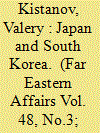

|
|
|
|
|
| Summary/Abstract |
This paper is concerned with the complex problems in relations between Japan and South Korea, rooted in the colonial rule of Japan on the Korean Peninsula. These include the territorial dispute over a group of islets in the Sea of Japan, the issue of Korean "comfort women," Seoul's claim to rename the Sea of Japan as the East Sea, the claim for compensation for Koreans who were mobilized for hard work in Japanese companies during the war, and others. We conclude that growing tensions in ties between Japan and South Korea are weakening the Japan-US-South Korea military-political alliance triangle, which could lead to a change in the balance of power in Northeast Asia.
|
|
|
|
|
|
|
|
|
|
|
|
|
|
|
|
| 6 |
ID:
091778
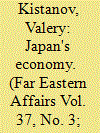

|
|
|
|
|
| Publication |
2009.
|
| Summary/Abstract |
The world financial crisis has struck Japan's economy more heavily than the economies of other countries. In order to emerge from the crisis the Japanese government put an emphasis on the Keynesian methods of regulation, which consist in pumping state financial means into the economy with a view to expanding domestic demand and eliminating disbalance between demand and supply.
|
|
|
|
|
|
|
|
|
|
|
|
|
|
|
|
| 7 |
ID:
160646
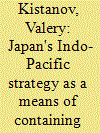

|
|
|
|
|
| Summary/Abstract |
This article analyzes Japan's policy in the basin of the Pacific and Indian Oceans. The term "Indo-Pacific Region" is more often used in scientific circles and mass media now instead of Asia-Pacific Region, which reflects the radical economic and political shifts in the basin of the two oceans. The Indo-Pacific strategy of Premier of Japan Shinzo Abe has an aim to contain the growing economic and military might of China - the main geopolitical rival of Japan in Asia. However, the implementation of this strategy faces difficulties.
|
|
|
|
|
|
|
|
|
|
|
|
|
|
|
|
|
|
|
|
|